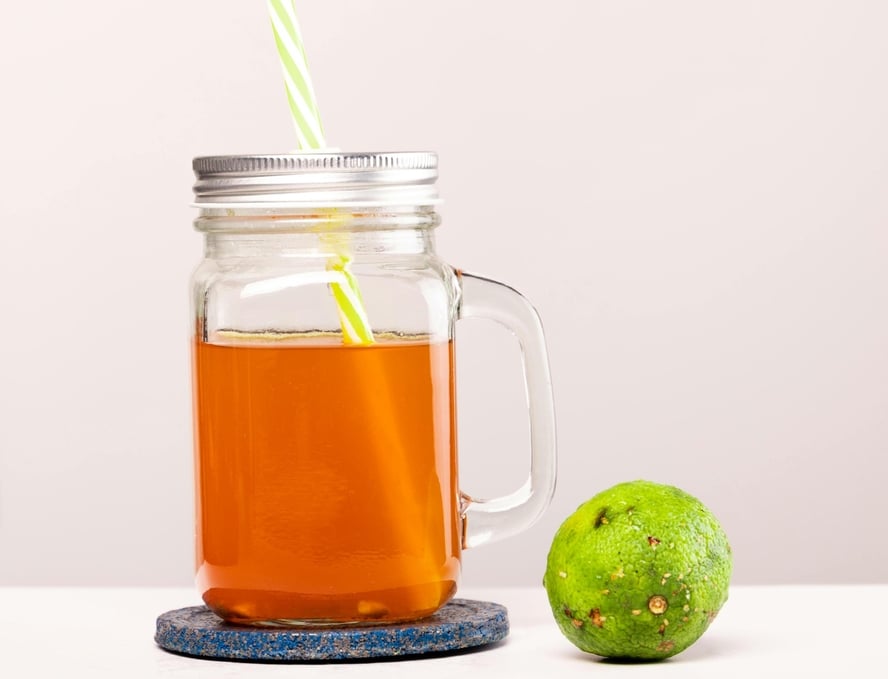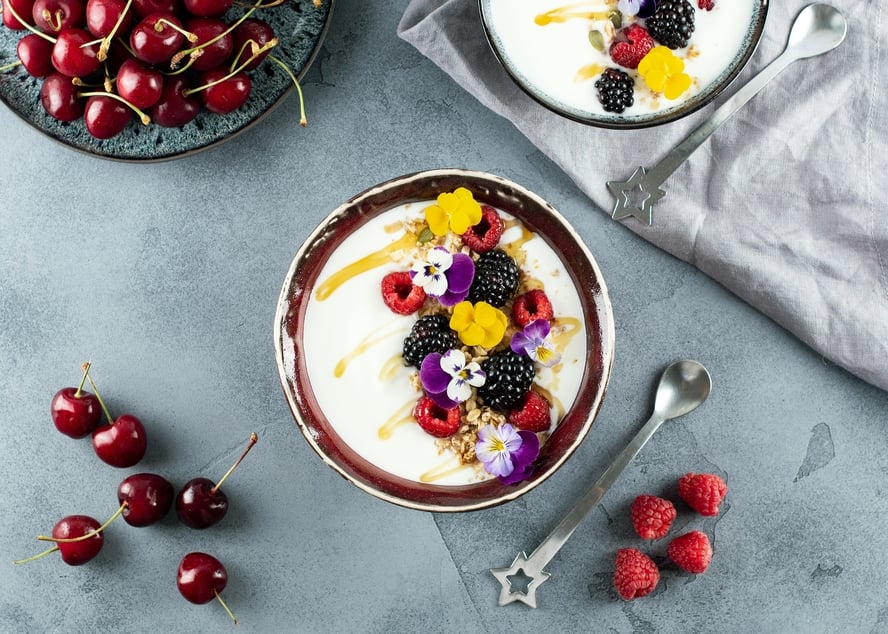Probiotic drinks are popping up everywhere these days, from grocery store aisles to famous cafés, all promising a fizzy path to better gut health. With claims of improved digestion, boosted immunity, and even enhanced mental well-being, it’s no wonder these drinks are flying off the shelves. But how much of this is science-backed, and how much is just clever marketing?

What Are Probiotics?
Probiotics are live bacteria and yeasts that are often hailed as gut health heroes. These microorganisms are known as the “good” bacteria that help maintain balance in your digestive system, potentially easing issues like bloating, gas, and irregular bowel movements. They’re also present in our bodies’ vaginal tracts, where they help maintain homeostasis.
Probiotic beverages are a dietary supplement, similar to taking a capsule or a powder1. When you down a probiotic soda, the common conception is that you’re adding more of these friendly microbes to your gut flora. However, it’s important to note that taking higher doses doesn’t necessarily enhance the benefits of probiotic sodas. The quality of the probiotic and the specific strain used are far more important than the quantity.
Does Your Stomach Really Need Probiotics?

Probiotics may be suggested to you if you’re experiencing symptoms of gut dysbiosis, or an imbalance of microorganisms in the intestines.2 Healthcare providers might recommend them to help restore balance to your microbiome, especially if it has been disrupted by illness or medical treatments. For example, after completing a course of antibiotics, probiotics can help replenish beneficial bacteria.
Note! This is not a substitute for professional medical advice. See your primary care physician when making changes to your lifestyle.
Some individuals take probiotics daily as a preventative measure to support overall health. Everyday factors like stress and dietary choices can impact your gut microbiome, and probiotics can be a useful tool in restoring and maintaining balance. If you are prone to digestive issues, you might find that a daily probiotic helps maintain gut health, reduces inflammation, and supports regular bowel movements. Some even believe that probiotics are the secret to clear skin!
What Are Probiotic Strains?
Probiotic strains are different types or “species” of the beneficial bacteria and yeasts that comprise probiotics. Just as many kinds of dogs (like poodles, bulldogs, and golden retrievers) have different traits, many strains of probiotics have specific characteristics and benefits. Not all probiotics are created equal. The benefits you hear about depend on the particular strains of bacteria involved.
How Do I Know Which Probiotic Strain Is For Me?
There isn’t a single best probiotic strain recommended universally by doctors, as the effectiveness of probiotic strains depends on the specific health condition or goal you’re targeting. However, some strains have been more widely studied and are commonly recommended for certain benefits.3 These include:
- Lactobacillus rhamnosus GG (LGG): This is one of the most researched strains and is often recommended for improving gut health — particularly for reducing diarrhea, including traveler’s diarrhea and antibiotic-associated diarrhea. It’s also noted for its role in supporting the immune system.
- Bifidobacterium lactis (BB-12): This strain is known for supporting digestive health, improving gut barrier function, and boosting immune health. It’s often recommended for managing constipation and enhancing the balance of gut bacteria.
- Saccharomyces boulardii: A yeast-based probiotic, this strain is widely recommended for its effectiveness in preventing and treating diarrhea, including those caused by antibiotics and infections. It’s also used in managing symptoms of irritable bowel syndrome (IBS).
- Lactobacillus acidophilus: Commonly found in yogurt and other fermented foods, this probiotic strain is known for aiding general gut health, helping to reduce lactose intolerance symptoms, and supporting the immune system.
- Bifidobacterium longum: Known for its role in breaking down carbohydrates and fighting harmful bacteria, this strain is often recommended for reducing inflammation in the gut and managing symptoms of IBS.

The Potential Pitfalls of Probiotic Beverages
Considering stocking your fridge with probiotic sodas? We understand the temptation — probiotic sodas generally sound like a fun, tasty way to improve your gut health. However, their claims should be taken with a grain of salt, and theyre not without their drawbacks. Many of these drinks are marketed as near-magical solutions to a range of health woes, but they shouldn’t be regarded as a one-stop solution. Probiotics are best used as a supplement to an already healthy diet and lifestyle, not a quick fix. Drinking a soda won’t undo the effects of poor eating habits or a sedentary lifestyle.
In some cases, introducing probiotics can even have the opposite of the desired effect. For example, if you already have an increased amount of bacteria in your digestive tract, certain probiotics can actually cause gas and bloating.4 We’re guessing that’s not what you hoped for when you splurged on a fancy new probiotics soda at the grocery store.
There’s also a myth that you have to consume probiotics daily for maximized benefits. Don’t buy into the marketing — probiotics can still be beneficial when taken occasionally, depending on your individual health needs and the strains you’re consuming. Ignore any claims that insist you need to follow any specific intake requirements on probiotics — there’s no universally recommended dose. It’s about finding what works for you, not hitting a daily probiotic soda quota.
Finally, while probiotics are generally safe for most people, those with compromised immune systems or specific health conditions should consult a healthcare provider before diving into trendy probiotic products.
How Do ‘Healthy’ Sodas Stack Up Against Their Sugary Siblings?
Probiotic sodas often market themselves as a healthier alternative to traditional sugary drinks. While it’s possible probiotic sodas might help you tackle your constant Diet Coke cravings, it’s still worth taking a closer look at the label. Some of these probiotic sodas still pack a significant sugar punch, even if it’s from “natural” sources like fruit juice. Just because a soda contains probiotics doesn’t automatically make it a healthy choice, especially if it’s loaded with added sugars and artificial flavoring.

If you’re purely weighing up a probiotic drink against a regular soda, it’s true that probiotic beverages offer more potential benefits due to the presence of live cultures. Just remember that those benefits can be negated if you’re consuming excessive sugar daily, which can contribute to the digestive issues you’re trying to address.
Do Probiotic Sodas Live Up to the Hype?
At the end of the day, probiotics — whether from sodas or other sources — are just one piece of the puzzle regarding overall health. They can contribute to better digestion and general well-being, but they’re not a silver bullet. In other words, incorporating probiotics into your diet might make a difference, but your priority should be a holistic health approach. A balanced diet, regular exercise, and other healthy habits tend to go a lot further than any probiotic supplements.
Enjoy a probiotic soda if it fits your taste and lifestyle, but don’t rely on it as your sole health strategy. Make informed choices, consult healthcare providers when necessary, and remember that true wellness comes from a combination of good habits — not just one trendy drink.
Note! The opinions and views expressed by the authors at Organic Authority in blogs and on social media and more, are theirs alone and do not necessarily reflect the views, opinions or position of Organic Authority, Inc and do not necessarily represent the views of Organic Authority sponsors and/or partners. Organic Authority content is for informational and entertainment purposes, and any views expressed should not be accepted as a substitute for qualified expertise. Any highlighted alternative studies are intended to spark conversation and are for information purposes only. We are not here to diagnose or treat any health or medical conditions, nor should this be relied upon as a substitute for professional medical advice, diagnosis or treatment, even if it features the advice of medical practitioners and physicians. When making any lifestyle or health changes, consult your primary care physician.
Sources:
- https://ods.od.nih.gov/factsheets/Probiotics-HealthProfessional/
- https://my.clevelandclinic.org/health/diseases/dysbiosis
- https://internationalprobiotics.org/home/resources/essentials/
- https://www.ncbi.nlm.nih.gov/pmc/articles/PMC7386065
Source link

